A Guide to Understanding and Treating Cat Constipation

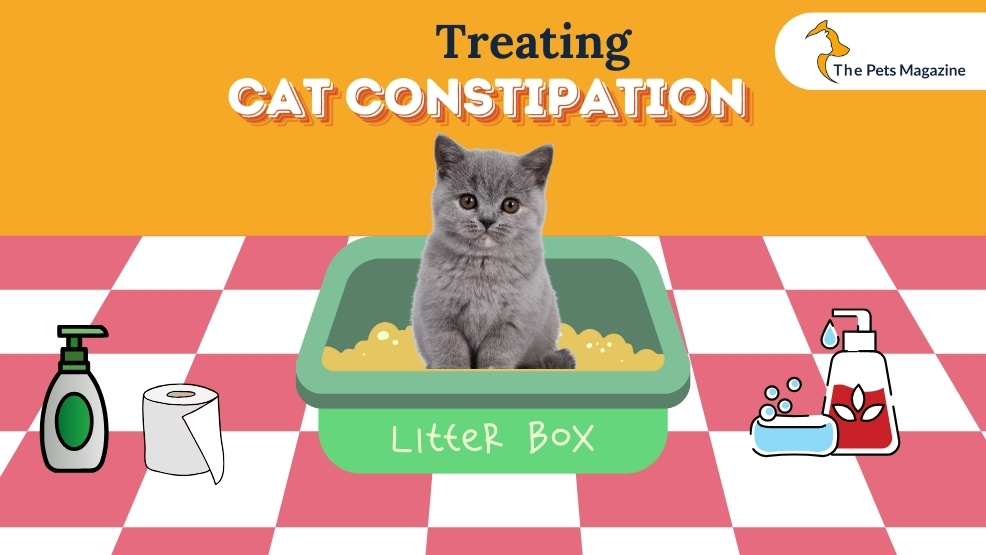
Constipation is a common yet often uncomfortable issue that affects us and our cat. And just like us, it causes a lot of distress and discomfort for our cats and, if left untreated, can lead to potentially severe complications.
So, while it may not be the most pleasant topic to read up on, it is essential to understand the causes, symptoms, and treatment options for cat constipation. In this article, we will provide valuable insights and advice on recognizing signs of cat constipation and explore common causes, preventive measures, and home remedies. So, dive in if you want to know what to do for cat constipation.
Signs and Symptoms of Cat Constipation
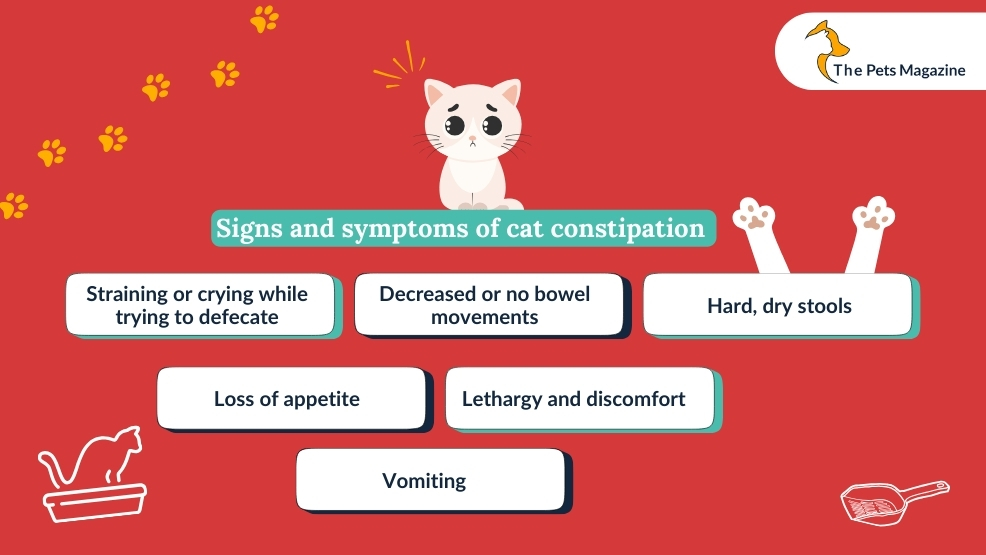
Early treatment is crucial to help your feline friend avoid the discomfort caused due to constipation. Knowing the signs and symptoms will help you to know if your cat is sick, and you can get the help they need. So, if you want to know how to help a cat with constipation, then here are the signs you need to watch out for:
Straining or crying while trying to defecate: If your cat struggles to pass stools, it may be a sign of constipation.
Decreased or no bowel movements: A lack of regular bowel movements can indicate constipation.
Hard, dry stools: Stools that are hard and dry can be difficult for your cat to pass.
Loss of appetite: You may notice that your cat is not eating much but acting normal. This is because constipation can cause discomfort and lead to a decrease in appetite.
Lethargy and discomfort: Your cat may appear lethargic or uncomfortable due to the buildup of waste in their digestive system.
Vomiting: In severe cases, constipation can cause vomiting in cats due to the buildup of toxins in the body.
Causes of Cat Constipation
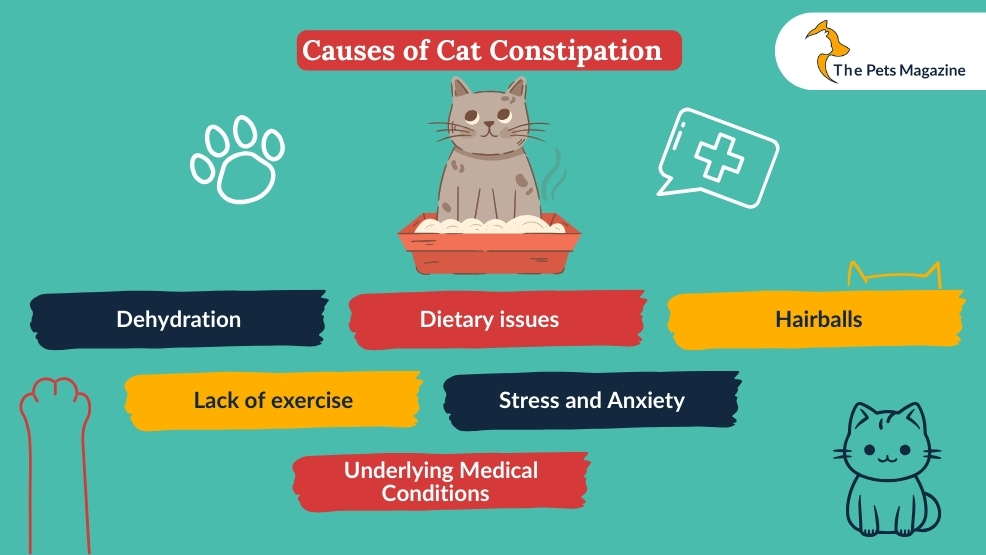
Constipation occurs when your cat has trouble in passing stools, resulting in infrequent or incomplete bowel movements. This can happen for many reasons, ranging from dietary imbalances to underlying medical conditions. Knowing about these common causes will ultimately help you to figure out how to relieve cat constipation. We have discussed these common causes in detail here:
Dehydration
Insufficient water intake can lead to dry, hard stools that are difficult to pass. Ensure your cat has access to fresh, clean water.
Dietary issues
An imbalanced diet lacking in fiber or sudden changes in food can disrupt your cat’s digestive system and lead to constipation.
Hairballs
Cats are known for their grooming habits, but excessive hair ingestion can cause blockages in the digestive tract.
Lack of exercise
A sedentary lifestyle can slow down your cat’s metabolism and bowel movements.
Stress and anxiety
Environmental changes, new surroundings, or stressful situations can impact your cat’s digestive health.
Underlying medical conditions
Certain diseases, such as inflammatory bowel disease, diabetes, or neurological disorders, can also contribute to constipation.
Risks and Complications of Untreated Cat Constipation
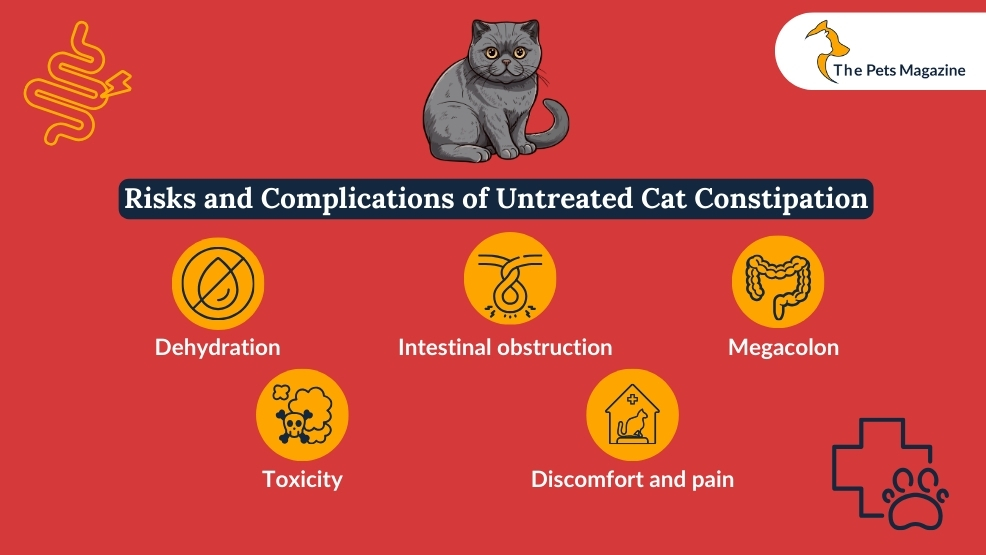
While constipation may seem like a minor inconvenience, leaving it untreated can lead to severe complications that can jeopardize your cat’s health and well-being. Some potential risks and complications include:
Dehydration: Prolonged constipation can lead to dehydration, which can be life-threatening.
Intestinal obstruction: Severe constipation can cause a complete blockage in the digestive tract, preventing the passage of stools and potentially requiring surgical intervention.
Megacolon: This condition occurs when the colon enlarges and loses its ability to function correctly, making it difficult for your cat to pass stools.
Toxicity: When waste accumulates in the digestive system, toxins can be reabsorbed into the bloodstream, leading to potential organ damage and other health issues.
Discomfort and pain: Constipation can cause significant discomfort and pain for your cat, affecting their quality of life.
These complications can be easily prevented if you look for the signs of cat constipation and start treating them early on. In the long run, it will ensure your cat’s overall well-being.
Dietary Changes for Relieving Cat Constipation
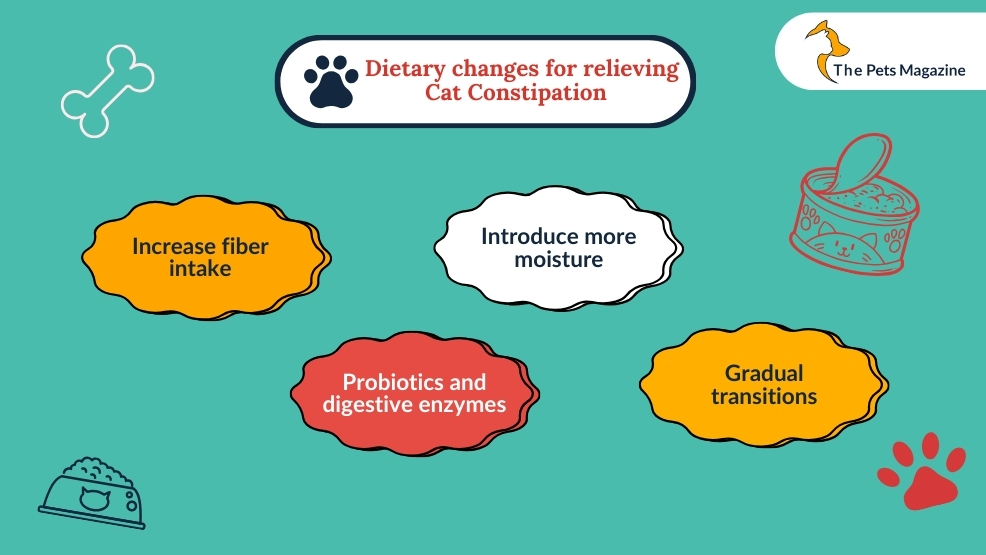
One of the most effective ways to alleviate constipation in cats is through dietary modifications. Here are some nutritional changes you can consider if you are wondering what can I give my cat for constipation at home:
Increase fiber intake: Gradually introduce high-fiber foods, such as pumpkin, psyllium husk, or specialized fiber supplements, to your cat’s diet. These additions can help soften stools and promote regular bowel movements.
Introduce more moisture: Increase the moisture content of your cat’s diet by incorporating wet food or adding low-sodium chicken broths to their meals. Proper hydration can help soften stools and ease constipation. If you are wondering if cats can have chicken broth, then the answer is yes, they can.
Probiotics and digestive enzymes: Consider supplementing your cat’s diet with probiotics and digestive enzymes, which can help promote a healthy gut environment and improve digestion.
Gradual transitions: If you need to switch your cat’s diet, gradually avoid potential digestive upset and constipation.
Remember, dietary changes should be made gradually and under the guidance of your veterinarian, as sudden shifts can exacerbate constipation or lead to other digestive issues.
Home Remedies for Cat Constipation
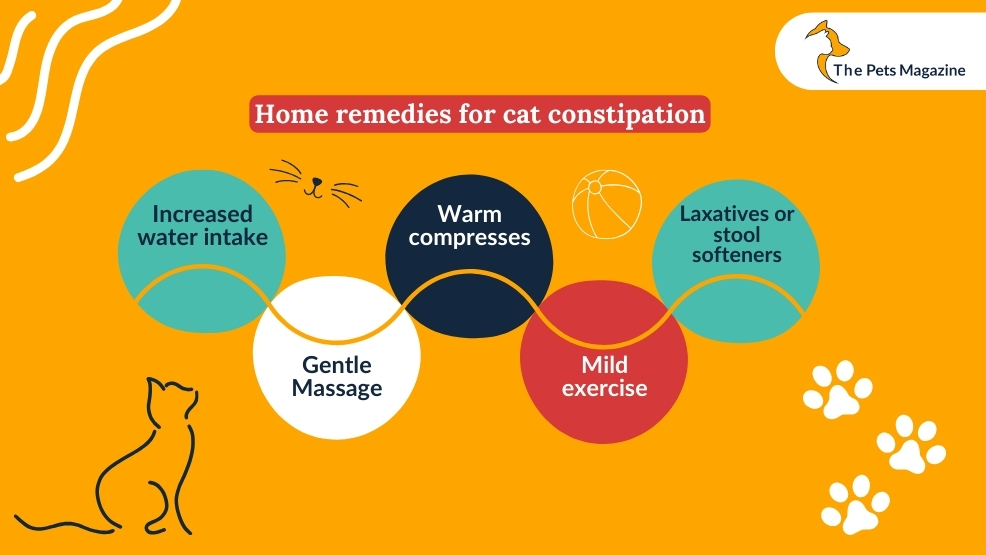
In addition to dietary modifications, you can try several home remedies to help alleviate your cat’s constipation. However, it’s essential to consult with your veterinarian before attempting home remedies, as some may not be suitable for your cat’s specific condition or health status.
Increased water intake: Encourage your cat to drink more water by providing fresh, clean water bowls, or consider adding low-sodium broths or tuna juice to their water to make it more appealing.
Gentle massage: Gently massage your cat’s abdomen in a circular motion to help stimulate bowel movements and alleviate discomfort.
Warm compresses: Apply a warm, damp compress to your cat’s abdomen for a few minutes to help relax the muscles and promote bowel movements.
Mild exercise: Encourage your cat to engage in gentle physical activity, such as playing with interactive toys or laser pointers, to help stimulate their digestive system.
Laxatives or stool softeners: In some cases, your veterinarian may recommend using mild laxatives or stool softeners to help alleviate constipation. However, following their instructions carefully is crucial. You should also never administer these products without professional guidance.
Remember, while home remedies can be helpful, they should not be relied upon as a long-term solution. If your cat’s constipation persists or worsens, it’s essential to seek veterinary assistance.
When to Seek Veterinary Assistance for Cat Constipation
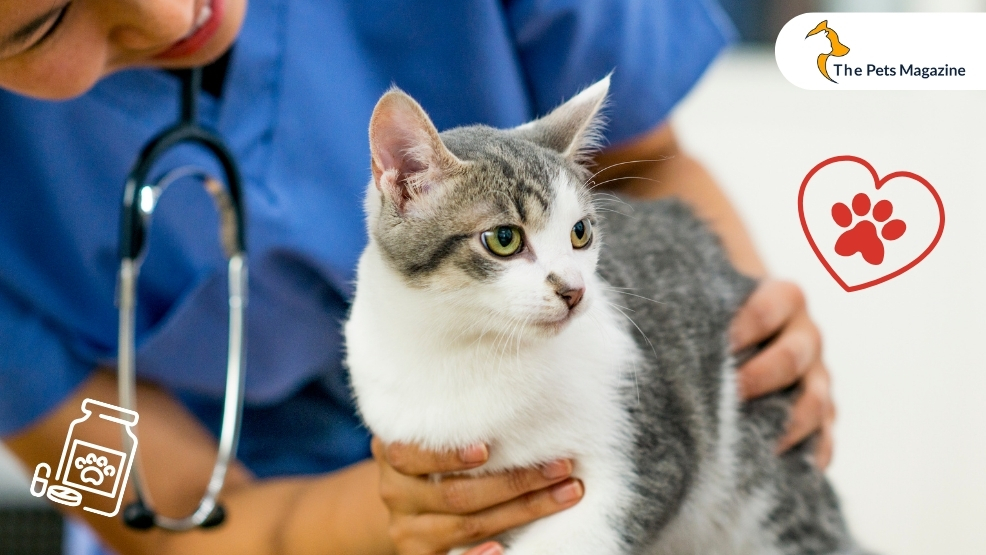
While dietary changes and home remedies can help manage mild cases of constipation, there are certain situations when it’s crucial to seek prompt veterinary assistance:
Prolonged constipation: If your cat has not had a bowel movement for more than 48-72 hours, it’s essential to consult your veterinarian immediately, as prolonged constipation can lead to severe complications.
Severe discomfort or pain: If your cat is exhibiting signs of severe discomfort, such as excessive vocalizations, lethargy, or loss of appetite, it’s essential to seek veterinary care promptly.
Vomiting or loss of appetite: If your cat is vomiting or refusing to eat, it could be a sign of a more serious underlying condition, and veterinary attention is required.
Presence of blood in stools: If you notice blood in your cat’s stools, it’s crucial to seek veterinary assistance immediately, as it could indicate a more severe issue.
Underlying medical conditions: If your cat has a pre-existing medical condition, such as diabetes, inflammatory bowel disease, or neurological disorders, it’s essential to consult with your veterinarian to determine the appropriate course of action.
Your veterinarian may recommend diagnostic tests, such as blood work, X-rays, or ultrasounds, to identify the underlying cause of your cat’s constipation and develop an appropriate treatment plan. In severe cases, hospitalization or surgical intervention may be necessary to treat constipation and address any underlying issues.
Final Say
Remember, prevention is key when it comes to your cat’s digestive health. So, ensure to implement a balanced diet rich in fiber and moisture, encourage regular exercise, and provide a stress-free environment for your cat. If constipation does occur, don’t hesitate to try dietary modifications or home remedies or seek veterinary assistance when necessary.
Taking care of your cat is an ongoing journey, still with patience, diligence, and the guidance of your veterinarian, you can help your feline companion maintain a healthy and regular digestive system, ensuring they continue to purr contentedly for years to come.






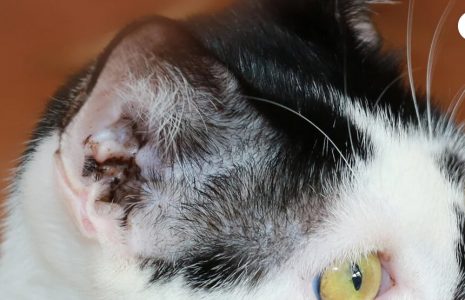

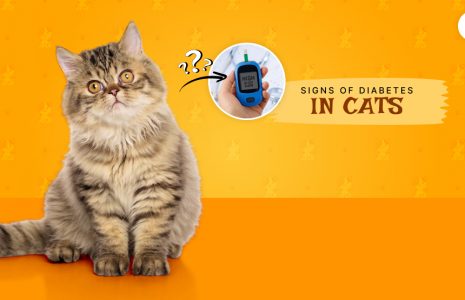
Leave A Comment